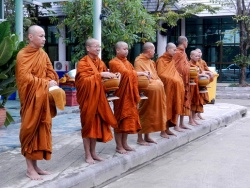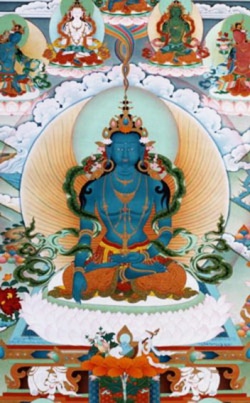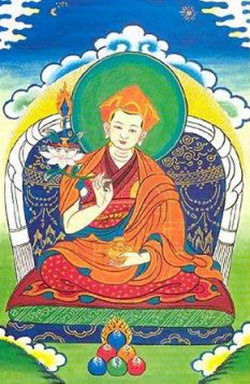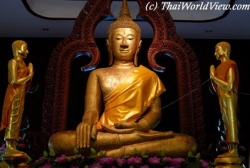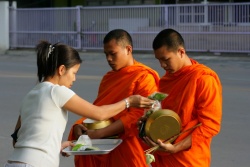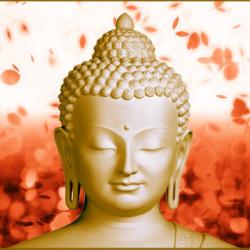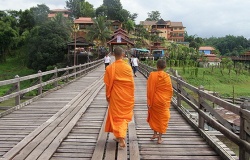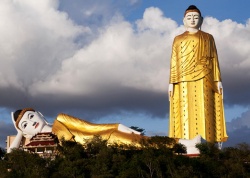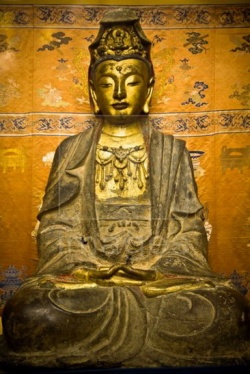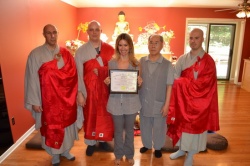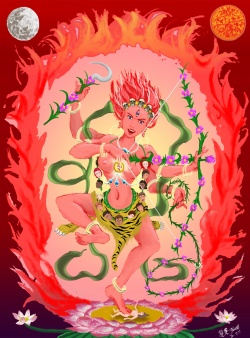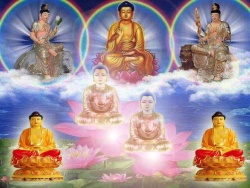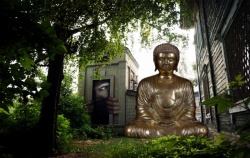Kutadanta Sutta
Thus have I heard:
The Blessed One once, when going on a tour through Magadha, with a great multitude of the brethren, with about five hundred brethren, came to a Brahman village in Magadha called Khanumata. And there at Khanumata he lodged in the Ambalatthika pleasaunce.
Now at that time The Brahman K¬tadanta was dwelling at Kanumata, a place teeming with life, with much grassland and woodland and water and corn, on a royal domain presented him by Seniya Bimbisara the king of Magadha, as a royal gift, with power over it as if he were the king.
And just then a great sacrifice was being got ready on behalf of Kutadanta The Brahman. And a hundred bulls, and a hundred steers, and a hundred heifers, and a hundred goats, and a hundred rams had been brought to the post for the sacrifice.
Now The Brahmans and householders of Khanumata heard the news of the arrival of the Samana Gotama. And they began to leave Khanumata in companies and in bands to go to the Ambalatthika pleasaunce.
And just then Kutadanta The Brahman had gone apart to the upper terrace of his house for his siesta; and seeing the people thus go by, he asked his doorkeeper the reason. And the doorkeeper told him.
Then Kutadanta thought: 'I have heard that the Samana Gotama understands about the successful performance of a sacrifice with its threefold method and its sixteen accessory instruments. Now I don't know all this, and yet I want to carry out a sacrifice. It would be well for me to go to the Samana Gotama, and ask him about it.'
So he sent his doorkeeper to The Brahmans and householders of Khanumata, to ask them to wait till he could go with them to call upon The Blessed One.
But there were at that time a number of Brahmans staying at Khanumata to take part in the great sacrifice. And when they heard this they went to Kutadanta, and persuaded him, on the same grounds as The Brahmans had laid before Sonadanda, not to go. But he answered them in the same terms as Sonadanda had used to those Brahmans. Then they were satisfied, and went with him to call upon The Blessed One.
And when he was seated there Kutadanta The Brahman told The Blessed One what he had heard, and requested him to tell him about success in performing a sacrifice in its three modes and with its accessory articles of furniture of sixteen kinds.
'Well then, O Brahman, give ear and listen attentively and I will speak.'
'Very well, Sir,' said Kutadanta in reply; and The Blessed One-spake as follows :--
'Long ago, O Brahman, there was a king by name Wide-realm (Maha Vijita), mighty, with great wealth and large property; with stores of silver and gold, of aids to enjoyment, of goods and corn; with his treasure-houses and his garners full. Now when King Wide-realm was once sitting alone in meditation he became anxious at the thought: " I have in abundance all the good things a mortal can enjoy. the whole wide circle of the earth is mine by conquest to possess. "twere well if I were to offer a great sacrifice that should ensure me weal and welfare for many days."
'And he had The Brahman, his chaplain, called; and telling him all that he had thought, he said: "So I would fain, O Brahman, offer a great sacrifice-let the venerable one instruct me how -- for my weal and my welfare for many days."
‘Thereupon The Brahman who was chaplain said to the king: "the king's country, Sire, is harassed and harried. there are dacoits abroad who pillage the villages and townships, and who make the roads unsafe. Were the king, so long as that is so, to levy a fresh tax, verily his majesty would be acting wrongly. But perchance his majesty might think: 'I'll soon put a stop to these scoundrels' game by degradation and banishment, and fines and bonds and death!' But their license cannot be satisfactorily put a stop to so. the remnant left unpunished would still go on harassing the realm. Now there is one method to adopt to put a thorough end to this disorder. Whosoever there be in the king's realm who devote themselves to keeping cattle and the farm, to them let his majesty the king give food and seed-corn. Whosoever there be in the king's realm who devote themselves to trade, to them let his majesty the king give capital. Whosoever there be in the king's realm who devote themselves to government service, to them let his majesty the king give wages and food. then those men, following each his own business, will no longer harass the realm, the king's revenue will go up; the country will be quiet and at peace; and the populace, pleased one with another and happy, dancing their children in their arms, will dwell with open doors."
‘Then King Wide-realm, O Brahman, accepted the word of his chaplain, and did as he had said. And those men, following each his business, harassed the realm no more. And the king's revenue went up. And the country became quiet and at peace. And the populace, pleased one with another and happy, dancing their children in their arms, dwelt with open doors.
'So King Wide-realm had his chaplain called, and said: "the disorder is at an end. the country is at peace. I want to offer that great sacrifice -- let the venerable one instruct me how -- for my weal and my welfare for many days."
Then let his majesty the king send invitations to whomsoever there may be in his realm who are Kshatriyas, vassals of his, either in the country or the towns ; or who are ministers and officials of his, either in the country or the towns; or who are Brahmans of position, either in the country or the towns; or who are householders of substance, either in the country or the towns, saying: "I intend to offer a great sacrifice. Let the venerable ones give their sanction to what will be to me for weal and welfare for many days."
‘Then King Wide-realm, O Brahman, accepted the word of his chaplain, and did as he had said. And they each -- Kshatriyas and Ministers and Brahmans and householders -- made alike reply: "Let his majesty the king celebrate the sacrifice. the time is suitable, O king! "
' Thus did these four, as colleagues by consent, become wherewithal to furnish forth that sacrifice.
'King Wide-realm was gifted in the following eight ways: --
'He was well born on both sides, on the mother's side and on the father's, of pure descent back through seven generations, and no slur was cast upon him, and no reproach, in respect of birth --
'He was handsome, pleasant in appearance, inspiring trust, gifted with great beauty of complexion, fair in color, fine in presence, stately to behold --
'He was mighty, with great wealth, and large property, with stores of silver and gold, of aids to enjoyment, of goods and corn, with his treasure-houses and his garners full --
'He was powerful, in command of an army, loyal and disciplined, in four divisions (of elephants, cavalry, chariots, and bowmen), burning up, methinks, his enemies by his very glory --
'He was a believer, and generous, a noble giver, keeping open house, a welling spring whence Samanas and Brahmans, the poor and the wayfarers, beggars, and petitioners might draw, a doer of good deeds --
He was learned in all kinds of knowledge --
He knew the meaning of what had been said, and could explain: "this saying has such and such a meaning, and that such and such" --
'He was intelligent, expert and wise, and able to think out things present or past or future --
'And these eight gifts of his, too, became wherewithal to furnish forth that sacrifice.
‘The Brahman his chaplain was gifted in the following four ways: --
'He was well born on both sides, on the mother's and on the father's, of pure descent back through seven generations, with no slur cast upon him, and no reproach in respect of birth --
He was a student repeater who knew the mystic verses by heart, master of the three Vedas, with the indices, the ritual, the phonology, and the exegesis (as a fourth), and the legends as a fifth, learned in the idioms and the grammar, versed in Lokayata (Nature-lore) and in the thirty marks on the body of a great man --
'He was virtuous, established in virtue, gifted with virtue that had grown great --
'He was intelligent, expert, and wise; foremost, or at most the second, among those who hold out the ladle.'
‘Thus these four gifts of his, too, became wherewithal to furnish forth that sacrifice.
'And further, O Brahman, the chaplain, before the sacrifice had begun, explained to King Wide-realm the three modes:
'Should his majesty the king, before starting on the great sacrifice, feel any such regret as: "Great, alas, will be the portion of my wealth used up herein," let not the king harbor such regret. Should his majesty the king, whilst he is offering the great sacrifice, feel any such regret as: "Great, alas, will be the portion of my wealth used up herein," let not the king harbor such regret. Should his majesty the king, when the great sacrifice has been offered, feel any such regret as : "Great, alas, has been the portion of my wealth used up herein," let not the king harbor such regret.'
‘Thus did the chaplain, O Brahman, before the sacrifice had begun, explain to King Wide-realm the three modes.
'And further, O Brahman, the chaplain, before the sacrifice had-begun, in order to prevent any compunction that might afterwards, in ten ways, arise as regards those who had taken part therein, said: "Now there will come to your sacrifice, Sire, men who destroy the life of living things, and men who refrain there from -- men who take what has not been given, and men who refrain there from -- men who act evilly in respect of lusts, and men who refrain there from -- men who speak lies, and men who do not -- men who slander, and men who do not -- men who speak rudely, and men who do not -- men who chatter vain things, and men who refrain there from -- men who covet, and men who covet not -- men who harbor ill will, and men who harbor it not -- men whose views are wrong, and men whose views are right. Of each of these let them, who do evil, alone with their evil. For them who do well let your majesty offer, for them, Sire, arrange the rites, them let the king gratify, in them shall your heart within find peace."
'And further, O Brahman, the chaplain, whilst the king was carrying out the sacrifice, instructed and aroused and incited and gladdened his heart in sixteen ways: "Should there be people who should say of the king, as he is offering the sacrifice: 'King Wide-realm is celebrating sacrifice without having invited the four classes of his subjects, without himself having the eight personal gifts, without the assistance of a Brahman who has the four personal gifts;' then would they speak not according to the fact. For the consent of the four classes has been obtained, the king has the eight, and his Brahman has the four, personal gifts. With regard to each and every one of these sixteen conditions the king may rest assured that it has been fulfilled. He can sacrifice, and be glad, and possess his heart in peace."
'And further, O Brahman, at that sacrifice neither were any oxen slain, neither goats, nor fowls, nor fatted pigs, nor were any kinds of living creatures put to death. No trees were cut down to be used as posts, no Dabbha grasses mown to strew around the sacrificial spot. And the staves and messengers and workmen there employed were driven neither by rods nor fear, nor carried on their work weeping with tears upon their faces. Whoso chose to help, he worked; whoso chose not to help, worked not. What each chose to do, he did, what they chose not to do, that was left undone. With ghee, and oil, and butter, and milk, and honey, and sugar only was that sacrifice accomplished.
'And further, O Brahman, the Kshatriya vassals, and the ministers and officials, and The Brahmans of position, and the householders of substance, whether of the country or of the towns, went to King Wide-realm, taking with them much wealth, and said: "this abundant wealth, Sire, have we brought hither for the king's use. Let his majesty accept it at our hands!"
' "Sufficient wealth have I, my friends, laid up, the produce of taxation that is just. Do you keep yours, and take away more with you!"
'When they had thus been refused by the king, they went aside, and considered thus one with the other: "It would not beseem us now, were we to take this wealth away again to our own homes. King Wide-realm is offering, a great sacrifice. Let us too make an after-sacrifice!"
' So the Kshatriyas established a continual largesse to the east of the king's sacrificial pit, and the officials to the south thereof, and The Brahmans to the west thereof, and the householders to the north thereof. And the things given, and the manner of their gift, was in all respects like unto the great sacrifice of King Wide-realm himself.
‘Thus, O Brahman, there was a fourfold co-operation, and King Wide-realm was gifted with eight personal gifts, and his officiating Brahman with four. And there were three modes of the giving of that sacrifice. this, O Brahman, is what is called the due celebration of a sacrifice in its threefold mode and with its furniture of sixteen kinds!'
And when he had thus spoken, those Brahmans lifted up their voices in tumult, and said: 'How glorious the sacrifice, how pure its accomplishment!' But Kutadanta The Brahman sat there in silence.
then those Brahmans said to Kutadanta: 'Why do you not approve the good words of the Samana Gotama as well-said?'
'I do not fail to approve: for he who approves not as well-said that which has been well spoken by the Samana Gotama, verily his head would split in twain. But I was considering that the Samana Gotama does not say: "Thus have I heard," nor "Thus behooves it to be," but says only "Thus it was then," or "It was like that then." So I thought: "For a certainty the Samana Gotama himself must at that time have been King Wide-realm, or The Brahman who officiated for him at that sacrifice. Does the venerable Gotama admit that he who celebrates such a sacrifice, or causes it to be celebrated, is reborn at the dissolution of the body, after death, into some state of happiness in heaven?'
'Yes, O Brahman, that I admit. And at that time I was The Brahman who, as chaplain, had that sacrifice performed.'
'Is there, O Gotama, any other sacrifice less difficult and less troublesome, with more fruit and more advantage still than this?'
'Yes, O Brahman, there is.'
'And what, O Gotama, may that be?'
‘The perpetual gifts kept up in a family where they are given specifically to virtuous recluses.
'But what is the reason, O Gotama, and what the cause, why such perpetual givings specifically to virtuous recluses, and kept up in a family, are less difficult and troublesome, of greater fruit and greater advantage than that other sacrifice with its three modes and its accessories of sixteen kinds
‘To the latter sort of sacrifice, O Brahman, neither will the Arahats go, nor such as have entered on the Arahat way. And why not? Because at it beating with sticks takes place, and seizing by the throat [42]. But they will go to the former, where such things are not. And therefore are such perpetual gifts above the other sort of sacrifice.'
24. 'And is there, O Gotama, any other sacrifice less difficult and less troublesome, of greater fruit and of greater advantage than either of these?'
'Yes, O Brahman, there is.'
'And what, O Gotama, may that be? "the putting up of a dwelling place (Vihara) on behalf of the Order in all the four directions.'
'And is there, O Gotama, any other sacrifice less difficult and less troublesome, of greater fruit and of greater advantage than each and all of these three?'
'Yes, O Brahman, there is.'
'And what, O Gotama, may that be?'
He who with trusting heart takes a Buddha as his guide, and the truth, and the Order -- that is a sacrifice better than open largesse, better than perpetual alms, better than the gift to a dwelling place.'
'And is there, O Gotama, any other sacrifice less difficult and less troublesome, of greater fruit and of greater advantage than all these four?'
'When a man with trusting heart takes upon himself the precepts -- abstinence from destroying life; abstinence from taking what has not been given abstinence from evil; conduct in respect of lusts; abstinence from lying words; abstinence from strong, intoxicating, maddening drinks, the root of carelessness -- that is a sacrifice better than open largesse, better than perpetual alms, better than the gift of dwelling places, better than accepting guidance.'
'And is there, O Gotama, any other sacrifice less difficult and less troublesome, of greater fruit and of greater advantage than all these five?'
'Yes, O Brahman, there is.'
'And what, O Gotama, may that be?'
'this, O Brahman, is a sacrifice less difficult and less troublesome, of greater fruit and greater advantage than the previous sacrifices.'
'And there is no sacrifice man can celebrate, O Brahman, higher and sweeter than this.'
And when he had thus spoken, Kutadanta The Brahman said to The Blessed One .
'Most excellent, O Gotama, are the words of thy mouth, most excellent! just as if a man were to set up what has been thrown down, or were to reveal that which has been hidden away, or were to point out the right road to him who has gone astray, or were to bring a light into the darkness so that those who had eyes could see external forms -- just even so has the truth been made known to me in many a figure by the venerable Gotama. I, even I, betake myself to the venerable Gotama as my guide, to the Doctrine and the Order. May the venerable One accept me as a disciple, as one who, from this day forth, as long as life endures, has taken him as his guide. And I myself, O Gotama, will have the seven hundred bulls, and the seven hundred steers, and the seven hundred heifers, and the seven hundred goats, and the seven hundred rams set free. to them I grant their life. Let them eat green grass and drink fresh water, and may cool breezes waft around them.'
Then The Blessed One discoursed to Kutadanta The Brahman in due order; that is to say, he spake to him of generosity, of right conduct, of heaven, of the danger, the vanity, and the defilement of lusts, of the advantages of renunciation. And when The Blessed One became aware that Kutadanta The Brahman had become prepared, softened, unprejudiced, upraised, and believing in heart, then did he proclaim the doctrine The Buddhas alone have won; that is to say, the doctrine of sorrow, of its origin, of its cessation, and of the Path. And just as a clean cloth, with all stains in it washed away, will readily take the dye, just even so did Kutadanta The Brahman, even while seated there, obtain the pure and spotless Eye for the truth, and he knew: 'Whatsoever has a beginning, in that is inherent also the necessity of dissolution.'
And then The Brahman Kutadanta, as one who had seen the truth, had mastered it, understood it, dived deep down into it, who had passed beyond doubt, and put away perplexity and gained full confidence, who had become dependent on no other for his knowledge of the teaching of the Master, addressed The Blessed One and said:
May the venerable Gotama grant me the favor of taking his to-morrow's meal with me, and also the members of the Order with him.'
And The Blessed One signified, by silence, his consent. then The Brahman Kutadanta, seeing that The Blessed One had accepted, rose from his scat, and keeping his right towards him as he passed, he departed thence. And at daybreak he had sweet food, both hard and soft, made ready at the pit prepared for his sacrifice, and had the time announced to The Blessed One: 'It is time, O Gotama; and the meal is ready.' And The Blessed One, who had dressed early in the. morning, put on his outer robe, and taking his bowl with him, went with the brethren to Kutadanta's sacrificial pit, and sat down there on the seat prepared for him. And Kutadanta The Brahman satisfied the brethren with The Buddha at their head, with his own hand, with sweet food, both hard and soft, till they refused any more. And when The Blessed One had finished his meal, and cleansed the bowl and his hands, Kutadanta The Brahman took a low seat and seated himself beside him. And when he was thus seated The Blessed One instructed and aroused and incited and gladdened Kutadanta The Brahman with religious discourse; and then arose from his seat and departed thence.
